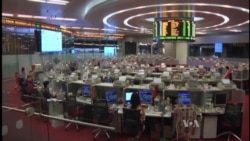In Asia, financial analysts say Greece's economic woes have had little direct impact on regional stock markets, which are instead focused on signs of trouble on China's exchanges. But there is growing concern that that if the financial repercussions from the Greek crisis are not contained, the impact could be wider and more severe than was initially anticipated.
Limited Direct Asian Impact
A Goldman Sachs financial assessment this week predicted Asian emerging markets will experience “rather limited direct financial exposure” from a Greek default on international loans and exit from the Eurozone. Asian liabilities or debts owed to European banks are only about five percent of the region’s gross national product (GDP). China’s exposure is the lowest at 3% GDP while Malaysia is the highest at 18% GDP. Asian nations also hold relatively few Europe assets.
Andy Xie, an independent financial analyst and former economist with the World Bank, said most Asian countries are prepared to handle some instability in financial markets.
“They have a very large foreign exchange reserves. So whatever the financial shock waves that go around, are not going to hit these place that much,” said Xie.
But Asian nations are still dependent on international exports. According to Goldman Sachs, exports to Europe from China and India alone account for 25% of total exports and 20% of combined GDP. In the manufacturing sector alone, Asian countries sell to Europe 7% of the high tech products, 5% of the textiles, and 5% percent of the transportation equipment they produce.
China Volatility
Adding to analysts concerns about contagion spreading from a possible Greek Eurozone exit, the so-called “Grexit,” is a possible economic slowdown in China. The recent and sudden drop in China’s stock market and reports of slow growth indicate the world’s second largest economy is struggling to grow its domestic market. Xie said financial markets still don’t understand how China’s transition from an export driven to a more balanced economy will take place and how long it will take. And that is creating volatility in the markets.
“If China’s transition is not smooth, economies will be hit pretty hard. For most Asian countries, China is the largest trading partner. So if Chinese demand is weakened, there will be a big impact,” said analyst Xie.
Region Concerns
At the same time, South Korea’s economy is trying to recover from a downturn in tourism and domestic spending following an outbreak in of Middle East Respiratory Syndrome. And although Japan has been experiencing relatively strong growth recently, it is still recovering from last year’s recession.
While Asia has limited direct exposure to a Greek default, it also has limited influence on the outcome. Goldman Sachs expects Greece to remain in the eurozone even if it continues to default on its international loans. Its analysts project weaker European currencies as a result of the crisis, but only leading to a limited, less than 2% decline, in Asian exports.
But a significant contraction in the European economy could stagnate global trade, weakening demand for the exports that are key to Asia's growth.
VOA Hong Kong Producer Pros Laput contributed to this report.






